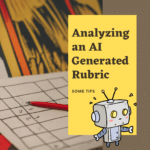Mathematical Mindsets
What I am reading right now is the book “Mathematical Mindsets” by Stanford math professor Jo Boaler (@joboaler). Without question, this is a book we ALL need to read. Even if you are not a teacher of math she has great research and insights for teaching and learning that is good for all of us.
Currently, I’m on page 60, but I think I may have almost underlined everything I’ve read so far.
Paradigm Shifts
When I first started teaching math classes, I taught them how I was taught. I came to figure out that these strategies were not working for my kids. They were not becoming masters at math and they certainly were not developing a love for mathematics. I cringe to think how many times I’ve said “quick, take the test before you forget it.” As if there is any value in being able to write something down right this second. I’ve had many people in my life challenge me on some traditional instructional ideas and my first thought was “that is plain crazy.” Unlike any other profession we have 18 years in the field before we even start our first day of teaching. This develops paradigms that are extremely hard to shift from.
Jo Boaler’s book “Mathematical Mindsets” provides a lot of paradigm shifts for you to consider.
Just because we are comfortable with something or because it worked for us does not mean it is the best approach. Truth: A lot of people have very very negative associations with math. Common thoughts about repetitive practice, being fast, worksheets and homework are well intentioned but are not having the positive impact on students that we think they have.
Favorite Takeaways
Introduction: A lot of people have negative associations with math and think this makes them unsmart in general.
Pg 1: “If you learn something deeply, the synaptic activity will create lasting connections in your brain.”
pg 3: Engage in complex tasks to grow your brain.
pg 7: Mindset is a big deal. Thinking you’re smart can actually hinder you. “The highest
pg 7: “The highest-achieving students in the world are those with a growth mindset.”
pg 7/8: HOW we praise students can have a big impact on their mindset and achievement. Praise the effort.
pg 9: Teacher attitudes about math can have a big impact on math achievement in girls.
pg 12: When the brain is challenged, it grows the most.
pg 12: Typically we do not value mistakes and worse we punish kids for mistakes. Mistakes are what helps student brains to grow.
pg 13: “More successful people make more mistakes.”
pg 17: Grading math work has a negative impact on mathematics learning.
pg 18: No brain growth when you get a problem correct.
pg 18: [tweet]”True learning depends on an understanding of how ideas fit together.”[/tweet]
pg 19: Students need to feel really comfortable offering different ideas and not being afraid of being wrong.
pg 21: STUDENTS need the opportunity to ask deep questions.
pg 21: Math is NOT “producing short answers to narrow questions under pressure.”
pg 27: “Mathematics does not equal calculating.”
pg 27: “The fastest-growing job in the United States is that of data analyst.”
pg 27: [tweet]”It used to be that employers needed people to calculate; they no longer need this.”[/tweet]
pg 29: “We want students reasoning in mathematics classrooms.”
pg 30: [tweet]Fast is not the same as smart. [/tweet]
pg 30: [tweet]”The widespread myth that math is about speed is one that is very important to dispel.”[/tweet]
pg 35: Do not do the problems if the numbers do not make sense.
pg 35: Students using number sense strategies instead of memorization strategies do better.
pg 36: Low achievers are often given drill and practice rather than number fluency.
pg 37: “Students can learn math facts and commit them to memory through conceptual engagement with math.”
pg 37: [tweet]Math fact drills “causes damage to students.” [/tweet]
pg 38: “When we put students through this anxiety-provoking experience, we lose students from mathematics.”
pg 39: “Automaticity should be reached through understanding of numerical relations, achieved through thinking about number strategies.”
pg 42: “The practice of methods over and over again is unhelpful.”
pg 42: “Worksheets that repeat the same idea over and over turn students away from math, are unnecessary, and do not prepare them to use the idea in different situations.”
pg 42: “We do not need students to take a single method and practice it over and over again.”
pg 45: Show concepts in unfamiliar ways. Do not always present perfect situations.
pg 46: [tweet]”There is a lot of evidence that homework of any form, is unnecessary or damaging.” [/tweet]
pg 46: “Pages of practice problems are sent home – with no thought, it seems, of their negative effect on the home environment that evening.”
I am totally guilty of this. I wrongly assumed for many years that you had to give homework so I assigned problems 1-30 whether they needed it or not. I eventually figured out that homework was not helpful. That I was wasting tons of class time and efforts going over homework, collecting homework, hassling kids about homework, calling parents about homework. I STOPPED GIVING HOMEWORK TO MY HIGH SCHOOL STUDENTS. My students did NOT perform worse. I had better relationships with students and parents. I had more class time to work with students. Everyone was happier. Achievement was not negatively impacted.
pg 51: “The vast majority of all math apps and games are unhelpful, encouraging drill and rote memorization.”










